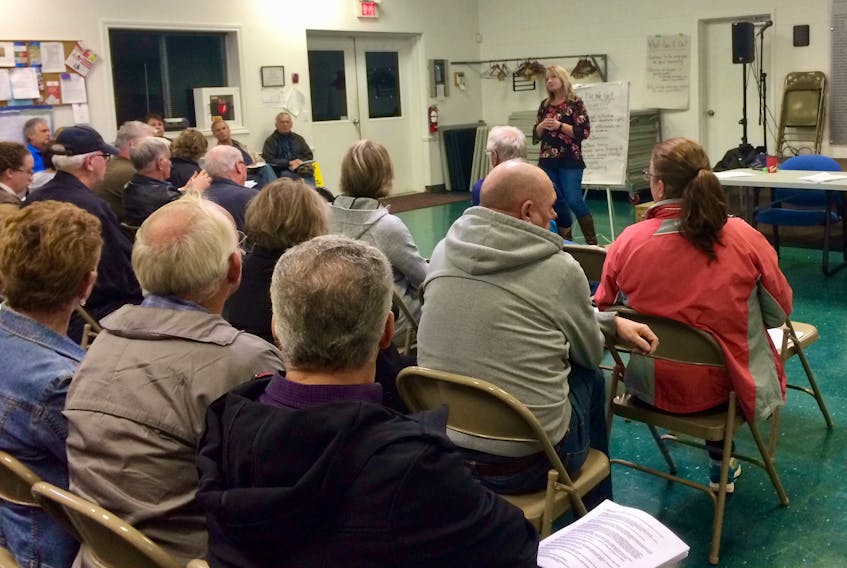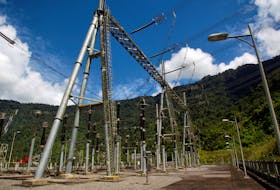When it comes to consolidation, it’s clear that some West Hants residents are frustrated, confused or would just like the whole thing to come to a grinding halt, thank you very much.
And West Hants councillors have the unenviable position of trying to explain how the process works, why it’s happening, and why it probably can’t be stopped at this point, sorry.
During a recent town hall meeting in Vaughan on Nov. 7, which are being run exclusively by councillors at community halls across the municipality, Jennifer Daniels and Randy Hussey attempted to explain what’s going on and cool tensions amongst the approximately 70 people gathered there.
One resident asked coun. Daniels what’s to be gained by consolidation in the first place?
Daniels said the main reason why both Windsor and West Hants councils agreed to consolidate via special provincial legislation was to improve efficiency and harmony between the two units, which have seen division and feuds in the past over things like the fire service and an arena.
Still, many remain unsatisfied that this decision was made without a plebiscite. Several in the room referred to it as “forced amalgamation.”
Daniels said Bill 55, the provincial legislation to consolidate the two units, puts the municipality and the residents “in the cockpit,” as opposed to the Nova Scotia Utility and Review Board dictating how things would happen.
“Decisions will be made much quicker, and that’s what you’re gaining (with consolidation), efficiency,” Daniels said. “We can merge our planning documents so there’s no competition.”
The question of what a new consolidated council’s districts will look like is still up the Nova Scotia Utility and Review Board, following a boundary review.
Councillor Hussey said he estimates the total number of councillors, between Windsor and West Hants, will be reduced. The next election in 2020, will be for the new boundaries.
Read More:
- West Hants hosting town halls across county
- Provincial legislature passes consolidation bill
- West Hants passes on plebiscite
Raymond Meehan, a West Hants resident who circulated a petition asking for West Hants council to hold a plebiscite on consolidation, said he’s worried about the two units not working together during negotiations through the transition committee.
“I’ve gone to joint council meetings and you guys have agreed on things, but then Windsor says no no we’re not doing that, so it could be the same thing (with consolidation negotiations),” Meehan said. “They agree to it, and then they turn around and say they’re not going to.”
“Hence the frustration of having two separate councils,” Hussey said.
A transition coordinator job posting is now active, and will remain until approximately Nov. 20. The position will be funded jointly by the town and municipality of West Hants. The applicant will have to be approved by the province.
The position lasts from November 2018 until March 2020.
Members from the previous West Hants council, including former warden Richard Dauphinee and former councillor Shirley Pineo were also in the audience and asked questions.
Pineo is firmly against consolidation, saying “things are fine the way they are.”
Windsor councillors Jim Ivey and Shelley Bibby were also in attendance.
A resident of the area, who is originally from Queens, said she saw her former community, just outside of Liverpool, come “back to life” following amalgamation, saying businesses are coming back. She’s hoping that will be the case for the Windsor-West Hants.
Residents were also directed to a new website that’s been created, as a source to get information on consolidation.
Speculation surrounding the consolidation continued to get dragged into the discussion, including that this is happening because “the Town of Windsor is broke.”
This is not true – the Town of Windsor does have debt, like most municipal units, but the debt service ratio remains well below 15 per cent, which is the provincial threshold when the dept. of municipal affairs starts to scrutinize a municipality’s spending. The town also reported a sizable surplus in the recent budget and reduced their residential and commercial tax rate.
Financially, the town is healthy, however, there are major infrastructure and capital costs coming down the pipe, like most small towns in Nova Scotia.
And even post consolidation, that debt stays within the boundaries of Windsor through an area rate, so those residents are the ones who will eventually have to pay it off – similar to Hantsport when they dissolved into West Hants in 2015.
It’s also not technically a ‘forced amalgamation’ as the elected municipal councils both voted to proceed with the process. Whether it’s anti-democratic, due to a lack of a plebiscite, is up to the individual to decide, but councillors are elected to make decisions on behalf of the people they represent. Don’t like the result? The next election is in 2020.








